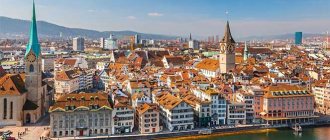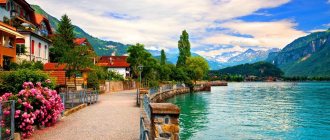Changing your country of permanent residence has long ceased to be something unusual. Choosing a place where you will be comfortable in terms of ecology, economic stability, social well-being and many other factors is a completely natural desire. In this sense, emigration to Switzerland looks quite attractive.
In the mountains of Switzerland in winter
Living in the very heart of Europe, in one of the most reliable and protected countries in the world, with good income and extensive opportunities for self-development and leisure, is a worthy dream for everyone. However, Switzerland's strict immigration regime makes it possible to achieve such benefits at a very high cost. Often those who come here for permanent residence do not receive citizenship, and their children become holders of a Swiss passport.
There are several ways to emigrate to Switzerland: obtain a temporary work permit, get a job as a highly qualified specialist in a company, having previously obtained a work visa. Or come here as a businessman. When choosing any path, you need to be prepared to spend more than 10 years of your life to obtain Swiss citizenship, as well as a significant amount of money.
How to get to Switzerland
You can come here with a simple tourist visa, which is required to visit any Schengen countries. However, to stay in the country for a long time, and especially to have permission to work and buy real estate, such entry documents do not provide.
National Swiss visa
To settle here for a long time, you need to obtain visas of category A, B or C. They give their holders some privileges. It is very important to strictly comply with all visa rules and requirements in order to be able to stay here for permanent residence, and later obtain Swiss citizenship - from 2021 this will be even more difficult.
Advantages and disadvantages of moving to Switzerland
Those wishing to emigrate to Switzerland for permanent residence need to know all the pros and cons of living in a highly developed country.
The main advantages include:
- social security;
- high wages and pensions;
- low crime rate;
- ecology;
- high level of healthcare;
- high-quality and free roads (compared to toll highways in neighboring countries);
- education system;
- visa-free entry into the Schengen countries.
Disadvantages of living in Switzerland:
- expensive real estate;
- high prices for rent and maintenance of housing;
- few attractions;
- increase in tuition prices;
- high taxes, mandatory fees, insurance.
Visa A
The document allows its holders to come to the country and get a job here. But these will be positions that do not require special knowledge, that is, you will be able to work as an unskilled worker. Having such a permit, only the applicant will be able to enter Switzerland. The right to be with him does not apply to family members.
A Swiss visa category A does not allow you to stay in the country for more than nine months. After this period has expired, you must return to your homeland. A return visit is possible no earlier than after three months. Therefore, work in Switzerland is seasonal, as is a temporary residence permit.
Seasonal work in Switzerland
In Switzerland, the labor market is focused on local residents, as well as job seekers from EU countries. Citizens of Russia and other foreigners are considered as last priority candidates for the position.
Employers who regularly deal with foreign workers are aware of visa requirements and therefore calmly provide temporary jobs for up to 9 months.
A category A visa can be obtained for several years in a row. And after registration four times, the foreigner applies for a visa of the following order - category B.
Visa B
The most extensive category, which is issued to a significant number of foreigners who wish to obtain a temporary residence permit in Switzerland and then stay here permanently. A special type of visa B is the Fiscal Deal. This option is suitable for those foreigners who can afford to live in Switzerland and not work. The conditions also apply to Russians preparing to emigrate here. You will need to prove your worth. To do this, there must be a decent amount in the account, at least 850 thousand euros.
Online bank account
In addition, there are restrictions on the time that must be spent in the country - at least 6 months annually. For the fact that you do not work in Switzerland, but spend your money, the state provides you with preferential tax conditions. Having a residence permit on such a visa, you will pay a fixed low rate, not tied to your actual income.
The B visa is issued to wealthy citizens who want to invest in the Swiss economy. Moreover, unlike other countries, no one here is interested in where you got your free funds, how you got them and how you earned them. There is no need to fulfill other mandatory requirements, for example, previous experience in participation in investment projects. The main role will be played by your capital and the desire to pour it into the country’s economy.
In addition to simple monetary participation, you can conduct a real business in Switzerland, and, accordingly, obtain a residence permit. It’s quite easy to open your own company here, after which you need to get a job as a manager and provide jobs to local residents.
Sample of a residence permit card in Switzerland
Highly qualified specialists can also go to live in Switzerland. To do this, you must receive an official invitation from the employer, on the basis of which you can apply for a category B visa.
A B visa gives the right to move to Switzerland not only to a specialist, but also to his family, which is not allowed by a category A visa. The validity period of a work permit, as well as a temporary residence permit with such documents, is 2 years. But once you have received it, it will not be so difficult to renew it annually.
Having lived in Switzerland for more than 12 years and having a total work experience in this country of at least 10, you can apply for a C visa - a permanent residence permit, and with it citizenship is not far away.
Traveling around Switzerland
The main ways to move to Switzerland for permanent residence
Most methods of immigration to Switzerland from Russia are no different from those allowed in the European Union. But at the same time, Swiss laws are more strict, and the authorities are somewhat selective about applicants for residence permits who do not have citizenship of an EU country or, for example, the USA.
Job
Working in Switzerland is the dream of many migrant workers. And not only from Russia. Those who can confirm a high qualification level, while possessing a profession in demand in the economy, will be able to move to work in this state.
To successfully immigrate, a Russian migrant must obtain a work visa to come to Switzerland and then apply for a residence permit. You can apply for a visa and residence permit on the basis of an invitation from a Swiss employer and if you have an employment contract concluded with him.
Citizens of European Union countries have priority in employment in the Alpine Republic.
For them, the employment procedure is simplified, as are the conditions for moving to Switzerland.
Investing and starting a business
If finances allow, invest some part of it in the development of the Swiss economy.
There are a number of restrictions for investors:
- the investor cannot be a pensioner;
- the minimum investment amount is at least 250,000 francs per year.
Opening a business is also considered a good opportunity to stay in the country. But for private business there are some financial and moral difficulties.
So, the process of opening your own business on the territory of the state:
- Opening an enterprise - $20,000-100,000 (expenses for the authorized capital).
- Registering a business with the tax authorities – $10,000-15,000.
- Obtaining a work permit for your employees.
- Official employment of employees of your company.
- Conducting business with regular payment of salaries and taxes.
Studies
Swiss universities are among the world's top 100. Their diplomas are recognized everywhere and provide a confident start in their career. Students undergo internships in large international companies and receive job offers before graduation.
It’s easy to apply: you need to pay for the course, including rent and pass the required tests. The difficulties begin later.
Education in Switzerland costs a lot of money, and accommodation is not cheap. Transportation costs, insurance, and leisure activities pose an additional, sensitive burden. At Swiss universities you have to study seriously, with serious dedication; they don’t allow you to cheat or truant. Failure to perform academically, violations of discipline, or failure to complete the program will result in expulsion and loss of the student visa.
Marriage and family reunion
Issues of family reunification or marriage registration are humanitarian. The country's migration authorities protect family values and provide visas in the case where one family member is a citizen of the Confederation or a person with a residence permit/permanent residence permit, and the other is a foreigner.
Important: when reuniting with a family, as well as when concluding a marriage with citizens of the Confederation, accelerated procedures for issuing a residence permit/permanent residence permit are applied.
It is important for migration authorities to be sure of the presence of family ties or the desire to marry the newlyweds. If the collected documents are convincing, confirmed by checks and interviews, then the issuance of long-term visas with residence permits becomes a formality. And, conversely, the presence of evidence regarding the fictitiousness of family relationships for the purpose of illegal entry into the territory of the country entails refusal and forced deportation.
Refugees
Switzerland accepts political and economic refugees, but is quite strict in selection. It is not part of the EU and is not subject to quotas, which Brussels distributes for the reception of internally displaced persons.
The explosive influx of refugees into Europe in recent years has led to Switzerland tightening its admission rules, to the point of prohibition, and coming under fire with cartoonish criticism. True, the Swiss are stubborn, and you won’t get through them.
Visa C
This type of visa practically equals your rights with citizens of the country. That is, you have the same privileges as holders of a red passport with a white cross, with the exception of the right to vote. This visa is valid for 2 years, after which it is subject to extension, if there are grounds. With a C visa, a foreigner can already buy real estate in the country for both leisure and living, and fully engage in business.
With Niderlasungbewiligung “C” you can live in Switzerland for 5 years without renewal.
You can apply for a visa renewal and obtain a permanent residence permit only after living in Switzerland with a type B visa for at least 5 years. Sometimes this period can be doubled. It all depends on what status you are here and where you came from. For example, it is much easier for residents of EU countries to obtain a C visa than for those arriving from Russia.
A preferential visa of this type is provided for the foreign spouse of a Swiss citizen.
After marriage, a B visa is first issued, and after just five years, after careful checks, it is replaced by category C.
Also, wealthy pensioners who can live comfortably in this country on their monthly lifetime income can count on permanent residence. They are strictly prohibited from working and carrying out any activities related to generating income in this country.
Pensioners in the Swiss city of St. Moritz
Having a B and C visa, you can open your own business in Switzerland and buy real estate.
Which area of Switzerland should you choose?
Everyone who is planning to immigrate to this country is concerned about the question of where is the best place to live in Switzerland: should you give preference to large cities or settle in the provinces? The answers to these questions are determined, first of all, by the economic component. For example, living in the western cantons will be much more expensive than in the German part of the state.
The most expensive cantons to live in: Basel and Geneva
In financial terms, the canton of Uri would be an ideal option - it has the lowest taxes, relatively inexpensive transport, and a relatively small amount is spent on various insurances. The worst place in terms of taxes is Neuchâtel, and the best is Zug.
Cheap cantons to live in:
- Uri.
- Glarus.
- Obwalden.
- Thurgau.
- Appenzell-Innerrhoden.
But from other points of view, Zurich or Geneva will look much more attractive.
Life in Zurich and Geneva
The city of Zurich, consisting of 12 districts, is to some extent considered youthful due to the large number of students (there are 20 universities in the city). There is so much to see, do and do.
Surely many are interested in finding out where is the best place to live in Zurich. So, if you are a wealthy person, you can afford to live in the city center or near the lake. As a budget option, the areas of Affolten or Efritikon, where housing prices are the most affordable, are suitable.
Another Swiss city that is of great interest is Geneva. Among its advantages, it is worth noting various attractions (for example, the old city and, of course, Lake Geneva), an abundance of beautiful parks, developed infrastructure, convenient public transport and much more. But keep in mind: prices for everything here are the highest in the country. Therefore, living in Geneva is not a cheap pleasure, and you need to be prepared for this.
As for housing, the ultimate dream is to acquire real estate on the coast of Lake Geneva, but not everyone can afford such a purchase, and the demand is incredibly high. However, the suburbs of Geneva are no less popular among the elite.
But ordinary people should pay attention either to residential areas or to small towns located near Geneva, such as Collonges, Cologny, Champel, Bellerive.
Documents for obtaining permanent residence
The immigration process to Switzerland is not only long, but also expensive. The naturalization path will take at least 12 years and about 200 thousand dollars per person. This is not the cost of life, but only of all kinds of duties and fees.
Before moving to the country, you need to collect a complete package of documents:
- Document all personal information, both personal and related to marital status. Originals and copies of passports, birth certificates, marriage certificates, and birth of children are suitable for this. And also your level of professional qualifications and competence. These can be diplomas, certificates, certificates;
- Provide a certificate of absence of problems with the law, in particular, criminal record;
- A bank account statement confirming the availability of the necessary amount for investment, running a business, and providing for one’s own life;
- The presence of a registered operating company in Switzerland or a signed employment contract from the employer (can be replaced by an invitation from his side);
- A language passport that confirms a sufficient level of proficiency in state languages.
On January 1, 2021, immigration rules changed; Switzerland has been moving towards this since 2013.
Among the positive innovations is the reduction of the period of residence in Switzerland from 12 to 10 years.
On the negative side, only holders of a category C visa can obtain citizenship.









